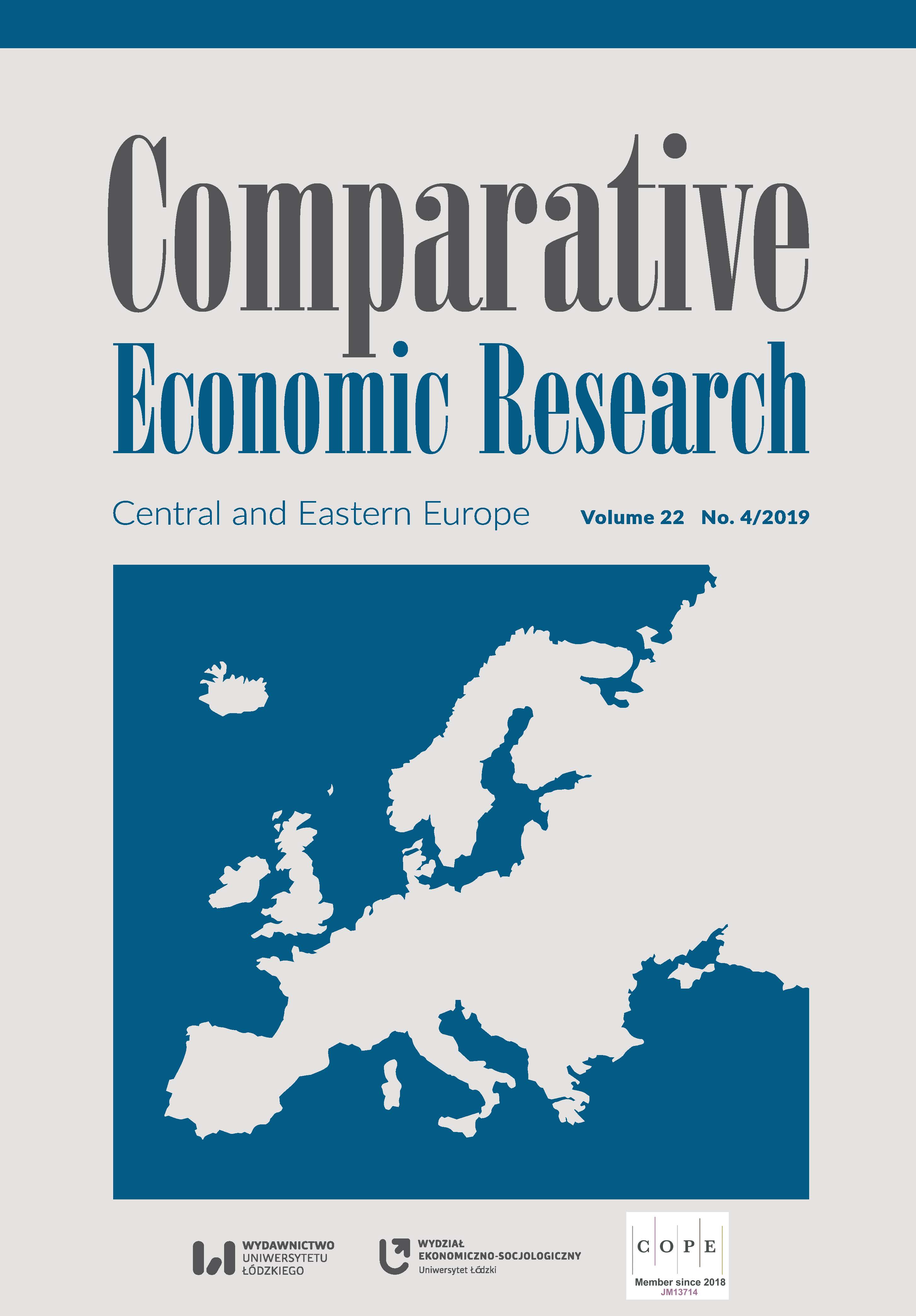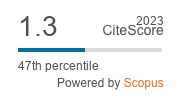The Zombie Phenomenon in Banking and Business: a Comparative Analysis and the Origin of the Institutional Problem
DOI:
https://doi.org/10.2478/cer-2019-0035Keywords:
bank system, banking, zombie banks, zombie business, nonperforming loans, institutional theoryAbstract
The research presents an investigation of the zombie phenomenon in banking and business. The main goals are as follows: to reveal the consequences of the threatening dynamics of nonperforming loans for the states of Central and Eastern Europe, Western Europe, the group of former USSR states, and Latin America; to demonstrate the zombie business phenomenon in the case of Ukraine and disclose a new form of zombie business on the basis of different tools with exception of banking loans. The authors believe the solution to the zombie banks problem will not be found in the growth of government influence or control but in the restructuring of the banking system based on a decentralized but strongly controlled bottom‑up model. The ineffectiveness of the institutional system also generates various forms of zombie business. The case of Ukraine is the best illustration of applying the tools, that are used in zombie business, with the exception of banking loans. The article helps to understand the influence of nonperforming loans on the economy and the perspectives for banking system formation in the light of the institutional aspect and interinstitutional interactions with the active participation of NPLs.
Downloads
References
Acharya, V.V. and Steffen, S. (2014), Falling short of expectations? Stress‑testing the European banking system, CEPS Policy Brief No. 315.
Google Scholar
Adalet McGowan, M., Andrews, D. and Millot, V. (2017), The walking dead: zombie firms and productivity performance in OECD countries, OECD Economics Department Working Papers, No. 1372.
Google Scholar
Banerjee, R. (2018), The rise of zombie firms: causes and consequences, https://www.bis.org/publ/qtrpdf/r_qt1809g.pdf (accessed: 15.02.2019).
Google Scholar
Borio, C., Gambacorta, L. and Hofmann, B. (2017), The influence of monetary policy on bank profitability, “International Finance”, 20 (1), pp. 48–63, https://doi.org/10.1111/infi.12104.
Google Scholar
Bush, S. (2018), Zombie Banks and Bank Bailouts, https://owlcation.com/social‑sciences/Do‑Zombie‑Banks‑Really‑Exist (accessed: 17.02.2019).
Google Scholar
Bülbül, D., Schmidt, R.H. and Schüwer, U. (2013), Savings Banks and Cooperative Banks in Europe, Goethe University, Frankfurt.
Google Scholar
Constâncio, V. (2016), Challenges for the European banking industry, Lecture at the Conference on “European Banking Industry: what’s next?”, organised by the University of Navarra, Madrid, 7 July 2016, https://www.bis.org/review/r1607014b.pdf (accessed: 17.02.2019).
Google Scholar
Henselmann, K., Ditter, D. and Lupp, P. (2016), The effects of the financial crisis on cooperative banks in Europe – A critical comparison, Working Papers in Accounting Valuation Auditing, https://www.econstor.eu/handle/10419/161671 (accessed: 1.03.2019).
Google Scholar
Interfax (2018), Share of non‑performing loans in Ukraine decreases to 56.09% in May, https://en.interfax.com.ua/news/economic/514728.html (accessed: 5.03.2019).
Google Scholar
Investopedia (2018), Zombie Bank, https://www.investopedia.com/terms/z/zombie‑bank.asp (accessed: 25.02.2019).
Google Scholar
Kanaya, A. and Woo, D. (2000), The Japanese banking crisis of the 1990s: sources and lessons for Japan, “Journal of Financial Economics”, 97 (3), pp. 398–417.
Google Scholar
Kawai, M. (2005), Reform of the Japanese banking system, “International Economics and European Policy”, 2 (4), pp. 307–335.
Google Scholar
Lacalle, D. (2017), The Rise of Zombie Companies – And Why It Matters, https://mises.org/library/rise‑zombie‑companies‑%E2%80%94‑and‑why‑it‑matters–0 (accessed: 15.02.2019).
Google Scholar
Markevičius, J. (2017), European banks must weed out bad loans to avoid zombie banks, https://www.lb.lt/en/news/j‑markevicius‑european‑banks‑must‑weed‑out‑bad‑loans‑to‑avoid‑zombie‑banks (accessed: 21.01.2019).
Google Scholar
Ministry of Finance of Ukraine (2018), https://www.minfin.gov.ua/en/news/borg (accessed: 20.01.2019).
Google Scholar
Mora, M. (2017), Dealing with non‑performing loans. European versus Czech Perspective, “Financial Stability Seminar”, 11th Edition, Bucharest.
Google Scholar
Nakaso, H. (2001), The financial crisis in Japan during the 1990s: how the bank of Japan responded and lessons learn, Bank International Settlements, BIS Papers No. 6.
Google Scholar
Ostrom, E. (1990), Governing the commons. The evolution of institutions for collective action, Cambridge University Press, Cambridge.
Google Scholar
Quiggin, J. (2012), Zombie Economics, https://eldivandenerdas.files.wordpress.com/2011/12/zombie‑economics.pdf (accessed: 15.01.2019).
Google Scholar
Radivojevic, N. and Jovovic, J. (2017), Examining of determinants of non‑performing loans, “Prague Economic Papers”, 26 (3), pp. 300–316.
Google Scholar
Schnabl, G. (2013), The macroeconomic policy challenges of balance sheet recession: lessons from Japan for European crisis, CESifo Working Paper 4249, CESifo.
Google Scholar
Schoenmaker, D. & Peek, T. (2014), The state of the banking sector in Europe, Economics Department Working Papers 1102, OECD.
Google Scholar
The Global Economy, Ukrainian Financial Forum, Ukraine: Small firms with bank credit, https://www.theglobaleconomy.com/Ukraine/small_firms_bank_credit/ (accessed: 23.01.2019).
Google Scholar
The World Bank data, Bank nonperforming loans to total gross loans (%), https://data.worldbank.org/indicator/FB.AST.NPER.ZS?type=shaded&view=map (accessed: 30.01.2019).
Google Scholar
Willam, D. (2015), Zombie banks and forbearance lending: causes, effects, and policy measures: dissertation, Cologne: Leipzig University, http://www.qucosa.de/fileadmin/data/qucosa/documents/15955/DissertationPublicationFinal.pdf (accessed: 12.02.2019).
Google Scholar
Downloads
Published
How to Cite
Issue
Section
License

This work is licensed under a Creative Commons Attribution-NonCommercial-NoDerivatives 4.0 International License.











